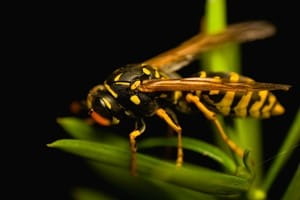
While many people may not know the difference between bees and wasps, understanding how to tell them apart is crucial, especially for homeowners, business owners, and anyone managing outdoor spaces. Recognizing which insect you're dealing with is the first step in choosing the right pest prevention approach and reducing potential risks, including allergic reactions.
Both bees and wasps belong to the Apoidea family, a group of insects that has existed since prehistoric times. Today, there are thousands of species worldwide, including nearly 18,000 in North America alone.
Despite their similarities, bees and wasps have distinct behaviors, appearances, and environmental roles. Here's what sets them apart:
What Is a Bee?
Bees, such as the honey bee and bumble bee, are vital pollinators that play a major role in the natural ecosystem. They are usually plump, with fuzzy, black-and-yellow striped bodies covered in fine hairs. These hairs help collect pollen as bees move from flower to flower in search of nectar.
Bees are generally non-aggressive and will only sting if they feel directly threatened or if their colony or queen is in danger. They are social insects that live in structured hives, working together to support the health of the group.
For homeowners, bees are often more of a nuisance than a danger, but it’s important to respect their space. A bee can sting only once before dying, so it’s typically not looking for conflict. If you encounter bees near your home or garden, stay calm; sudden movements or panicked breathing may increase the chance of a defensive response.
When needed, seek guidance from a trained professional who understands how to safely address the presence of bees without harming people or the environment.
What Is a Wasp?
Wasps come in many forms, some are solitary, while others live in colonies. The most encountered species include yellowjackets, paper wasps, and hornets. Unlike bees, wasps tend to have slim, smooth bodies with a narrow waist and sharp thorax. They are more streamlined in appearance.
Wasps can serve various ecological roles, including pollination, pest control, and parasitism, but many species are known for their aggressive behaviour, especially when disturbed. Unlike bees, wasps can sting multiple times, making them a more serious threat when defending their territory.
Wasps may build nests:
Because they often seek out protected or shaded areas, unmaintained outdoor spaces can attract wasps looking for a place to build their nests.
Why It Matters
Stings from bees and wasps can cause a range of reactions, from mild swelling and irritation to more serious allergic responses. While not everyone is highly sensitive, repeated stings or an attack from a disturbed nest can lead to significant health risks, especially for young children, older adults, or individuals with known allergies.
Wasps can become aggressive when they feel threatened. When one wasp stings, it may release pheromones that signal others to join in the defense. This can turn a single sting into a potentially dangerous swarm situation.
What Should You Do?
If you notice increased bee or wasp activity on your property, it’s best not to approach the nest or attempt removal yourself. These insects may react defensively when their space is invaded, and without proper training and safety equipment, the risk of injury is high.
Instead, consult a licensed pest control professional who can:
While bees and wasps may appear similar at first glance, their differences in behaviour, appearance, and risk levels make proper identification essential. Whether you're maintaining a backyard, garden, or commercial property, understanding which insect you're dealing with is key to ensuring a safe environment for everyone.